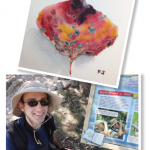Unsurprisingly, Dr. Paramo’s least favorite activity is cleaning out messy bird cages. Sometimes, he says, it can take several hours.
Still, Dr. Paramo wouldn’t trade his beloved birds for any dog or cat, no matter how well behaved. He says parrots bond with humans for life, make excellent companions and sometimes perform special mating dances that are unique to each
species. Casper sings beautiful melodies and at times, can be “hilarious,” he says, when mimicking people’s laughter.
“They’re just amazing, beautiful creatures overall,” Dr. Paramo says, adding that just being around them takes the edge off a hard workday. “That’s why I’m so obsessed with them.”
Dr. Paramo does have a warning for potential bird owners: “If people aren’t ready, a lot of them can’t handle birds, and the birds end up homeless. They’re not starter pets.”
Carol Patton, a freelance writer based in Las Vegas, Nev., writes the Rheum after 5 column for The Rheumatologist.


